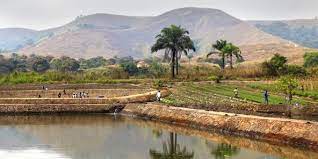Republic of Congo (Brazzaville)
The Republic of Congo (not to be confused with its neighbor the Democratic Republic of Congo), is a Central African country bordered with the Congo River. Nouabalé-Ndoki and Odzala National Parks are among the most untouched forests reserves in Africa, and they are still hiding an astonishingly diverse fauna and flora. Half of the world’s population of lowland gorillas and herds of forest elephants are found in the lush jungles of the republic of Congo. The Republic of Congo is still a rather unknown country, but it will surely become one of the next finest ecotourism destination, thanks to its natural beauty and abundant rare wildlife.
HEALTH INFORMATION
We make every effort to ensure that the information posted on our website is up to date and accurate according to the latest public health recommendations; however, it is impossible for us to make changes on a daily basis.
For the most current travel health recommendations, please call our clinic as make an appointment with one of our travel health professionals.
REPUBLIC OF CONGO (BRAZZAVILLE) – RECOMMENDED VACCINES
| Flu – Influenza | Seasonal influenza occurs worldwide. The flu season usually runs from November to April in the northern hemisphere, between April and October in the southern hemisphere and year round in the tropics. Influenza (flu) is caused by a virus spread from person to person through coughing and sneezing or by touching infected surfaces. Everyone 6 months and older should get a flu vaccine yearly. Vaccine is recommended 14 days prior to departure. |
| Hepatitis A | Recommended for all travelers. |
| Hepatitis B | Recommended for all travelers. |
| Causes, Symptoms & Treatment – Typhoid fever | Recommended for all travelers. |
| Tetanus – Diphteria – Pertussis Vaccine | Tetanus: In exceptional circumstances (eg, stay in a region where access to health care is limited), for a person aged 18 years or older, 1 dose of DT may be given if 5 years or more has elapsed since the last dose. Otherwise, one booster dose at the age of 50*. Pertussis (Whooping Cough): 1 dose is recommended for pregnant women, for every pregnancy, regardless of immunization history and the interval since the last dose (betwen week 26 and 32). *Only applicable for Quebec. |
| Polio | One-time booster recommended for any adult traveler who completed the childhood series but never had polio vaccine as an adult (after 18 years old only). |
| Measles – Rubella – Mumps | Two doses recommended for all travelers born after 1970, if not previously given. |
| Cholera | For humanitarian workers and health care providers. |
| The Yellow Fever Vaccine | A proof of vaccination against yellow fever may be required upon entry in to this country. Some travellers may not be eligible to receive this vaccine. Please enquire with your health care professional regarding your specific details. It is important to note that the vaccine should be administered at least 10 days prior to your departure. For further information, please consult with the World Health Organization (WHO) website: https://www.who.int/ith/ith- |
| Routine vaccines (dCaT, Polio, Meningococcal, Shingles, Pneumococcal, Hepatitis B, HPV, MMR & Varicella) | Recommended for all travelers |
| African Tick Bite Fever | Presence. All travellers should protect themselves against tick bites. |
| Transmission, Symptoms and Prevention – Rabies | For travelers at high risk of animal bites or being involved in activities with bats, dogs and other mammals. Clients who plan to visit remote areas may consider receiving this vaccine. Important to note the pre-exposure rabies vaccine is administered in 2 doses with one week interval between doses. Post-exposure vaccination is always recommended, even for those previously vaccinated. |
| Schistosomiasis | Avoid swimming in fresh water. |
| Turista – Traveler’s Diarrhea (ETEC) | Talk to your health care professional about the risks and precautionary measures to take, as well as the Dukoral® vaccine. Important to note that the Dukoral vaccine is an oral vaccine given in 2 doses, recommended at least 2 weeks prior to departure. |
| Malaria | Malaria is present in this country. The risk may be region specific. Prophylaxis measures to be discussed with the health care professional. |
| Dengue Fever, Chikungunya and/or Zika | There are many illnesses that are transmitted via mosquito bites and unfortunately we do not have vaccines to protect us against most of them. It is important to inquire with your healthcare professional regarding the specific risks and the different illnesses presently in circulation. |
RECOMMENDED MEDICATIONS
| Antimalarials Recommended | Malarone, Doxycycline or Mefloquine |
| Acetazolamide/Dexaméthasone | Recommended to prevent Acute mountain sickness (AMS). |
| Antibiotics Traveler’s Diarrhea | Azithromycin or Suprax |
MEDICAL CARE
The health care system in the Republic of the Congo is particularly fragile, due to recent political and social crises. The country provides very poor medical care services. The medical infrastructure is inadequate and the country lacks trained staff. Access to basic care is very limited and the Republic of the Congo regularly suffers from shortages of medicines. In rural areas, health care facilities can be non existent.
Emergency services are extremely slow and inefficient.
Access to medicines is very bad in the Republic of the Congo. It is essential that you bring sufficient medical supplies when traveling to the country.
SECURITY ABROAD
Congolese authorities occasionally carry out security operations against rebel militias in certain regions of Pool, a department in southeast Congo. Criminals often commit crimes and acts of banditry, especially kidnapping for ransom. Attacks on private and collective transportation vehicles are common, particularly on the roads linking Brazzaville–…
CANADIAN EMBASSY
Emergency services
There’s no central number for emergency services. Report crimes to local police at 242 06 665-4804. Note that most police speak French but not English.
Research and carry contact information for local medical facilities.

